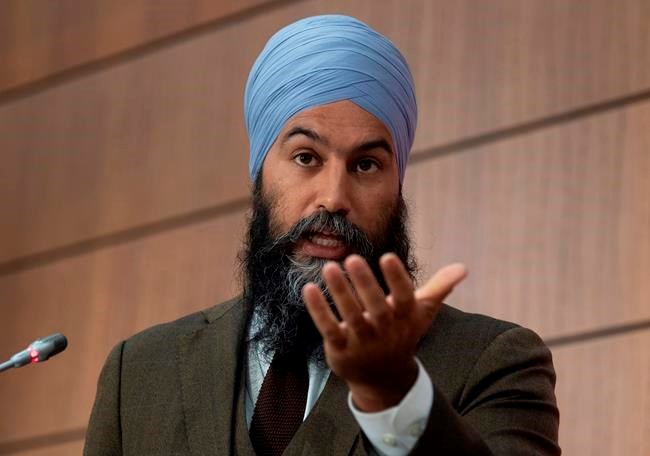OTTAWA — The Trudeau Liberals' push for changes to a key benefit for workers affected by the COVID-19 pandemic hit political roadblocks as the New Democrats withdrew support for a draft bill that would fine or imprison people who made fraudulent claims.
Prime Minister Justin Trudeau said Tuesday the legislation would enact punishments for those who knowingly and wrongfully claimed the $2,000-a-month benefit — not those who simply made mistakes in good faith.
Speaking outside his Ottawa residence, Trudeau said he believed his minority government would gain opposition support for the legislation, which has been subject to closed-door negotiations among the parties.
The opposition parties were given a copy of the draft bill on the weekend by the Liberals, ahead of a sitting of the House of Commons on Wednesday.
NDP Leader Jagmeet Singh said his party couldn't support the legislation because it would hurt the very people the Canada Emergency Response Benefit was designed to help — vulnerable people who have faced financial hardship because of COVID-19.
He also said it was hypocritical for Trudeau to take a knee on Parliament Hill during Friday's countrywide anti-racism demonstrations while such a bill was being drafted.
Singh said new criminal penalties will hit poor and racialized people harder, and that the tax system should be used to recover funds that should not have been paid.
Singh said all parties previously agreed that people should not be unduly penalized if they applied for benefits in good faith.
"They're effectively opening up the floodgates to retroactively charging people just for applying," Singh said, adding a moment later: "That is the opposite of what we should be doing during a pandemic."
Liberal MP Adam Vaughan said on Twitter that the tax system could deal with overpayments, that existing laws could deal with fraud, and that he wouldn't support jailing CERB recipients "unless they sign up horses with fake (social insurance) numbers and live in Oklahoma."
Conservative finance critic Pierre Poilievre wouldn't comment on the legislation that has yet to be tabled in the House of Commons, or on whether the Tories support extending the CERB. He said federal programs should focus on encouraging people to get back to work.
"There's no way you can replace the workforce with a government program," Poilievre said, in an appearance with the Conservative Treasury Board critic Tim Uppal.
"That's why the economy needs to open up and people need to have the opportunity to go back to their jobs, to earn a paycheque."
The most recent federal figures show 8.41 million people have applied for the CERB, with $43.51 billion in payments made as of June 4.
The figures surpassed anything the government originally expected, which is why the Finance Department recently updated its spending projections to put a $60-billion price tag on the measure, up from $35 billion.
At the same time, the government is revising downward how much it will spend on a wage subsidy program to $45 billion from $73 billion. The most recent figures for the wage subsidy show that as of June 8 that 209,370 companies have applied for help, and $10.5 billion has been paid out.
Trudeau said the government is looking at how to end the CERB and move more people to the wage subsidy.
"So we're looking very carefully at how we will move forward with the package of measures that we've put forward," Trudeau said, "in a way that makes sense to both encourage people to get back to work, encourage companies to get going again, while at the same time supporting and protecting those people who cannot work because of the pandemic."
The people most likely to be affected by any disincentive to remaining off work would be low-wage earners who have been disproportionately affected by job losses since March, said David Macdonald, senior economist at the Canadian Centre for Policy Alternatives.
"There will likely be very few, if any, people who are actually jailed, but the threat is very powerful," Macdonald said. "Some businesses prefer the stick as it's cheaper, but it's going to be low-wage workers who will be hit by that stick."
Program changes and changes in spending — about $153 billion at last count — require a thorough review by the federal auditor general, Poilievre said. The Tories called on the government to increase the auditor general's budget by about $10.8 million, which is what the watchdog says it needs to review COVID-19 and infrastructure spending without having other work fall by the wayside.
Trudeau said his government had been open and transparent about spending but wouldn't commit to providing an update on federal finances. He said any projections "would be incredibly unreliable" because the government doesn't yet know the total impact on the Canadian economy.
The parliamentary budget officer has estimated the deficit for the fiscal year could be $260 billion or more.
This report by The Canadian Press was first published June 9, 2020.
Jordan Press and Mike Blanchfield, The Canadian Press




